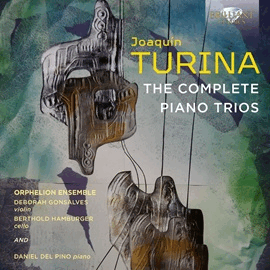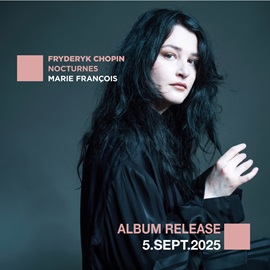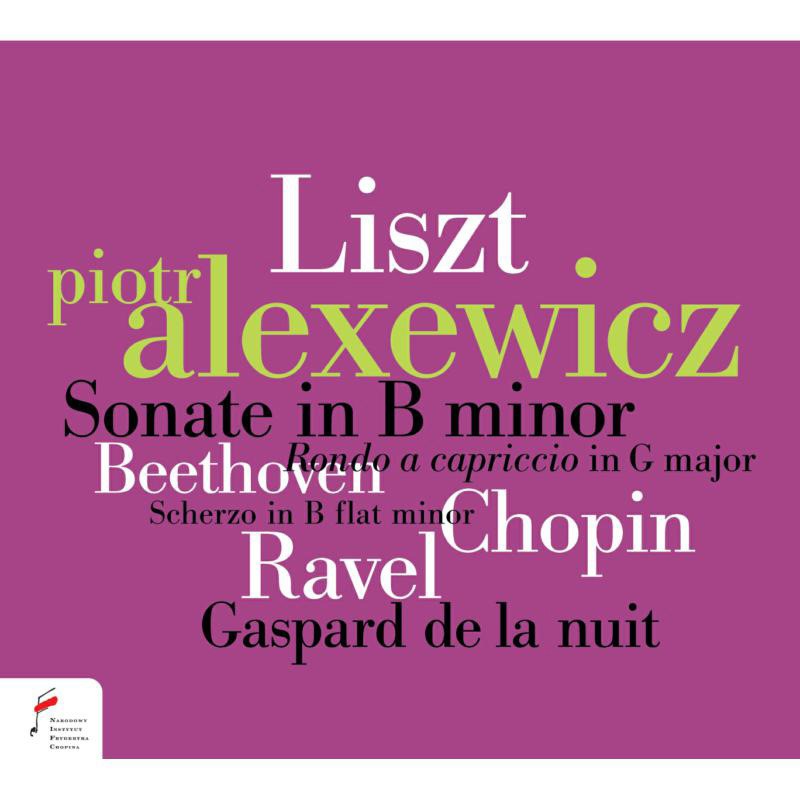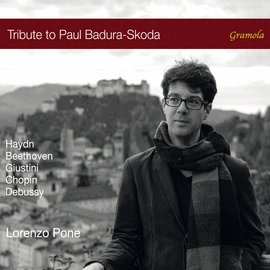 Liszt: Klaviersonate h-Moll, S178; Beethoven: Rondo a capriccio op. 129; Chopin: Scherzo Nr. 2 op. 31; Ravel: Gaspard de la Nuit; Piotr Alexewicz, Klavier; 1 CD Frederick Chopin Institute NIFCCD704; Aufnahme 04/2018, Veröffentlichung 11/2019 (o.A) - Rezension von Remy Franck
Liszt: Klaviersonate h-Moll, S178; Beethoven: Rondo a capriccio op. 129; Chopin: Scherzo Nr. 2 op. 31; Ravel: Gaspard de la Nuit; Piotr Alexewicz, Klavier; 1 CD Frederick Chopin Institute NIFCCD704; Aufnahme 04/2018, Veröffentlichung 11/2019 (o.A) - Rezension von Remy Franck
Zweifellos wird sich die Interpretation der Liszt-Sonate durch den im Jahr 2000 geborenen Polen Piotr Alexewicz noch verändern, tiefgründiger werden. Aber der junge Pianist geht sie in seinem Alter vorerst mal sehr intensiv und zupackend an, kraftvoll (hin und wieder etwas laut), mit manchmal schnellen Tempi, dann aber auch zumindest enthusiastisch, wenn nicht gar ekstatisch. Er hat aber auch die Sensibilität für ganz zart formulierte, reflektive Passagen und bestätigt im Großen und Ganzen den guten Eindruck, den ich von ihm gewann, als er 2018 bei der Preisverleihung der ICMA (International Classical Music Awards) in Katowice auf Einladung des Penderecki-Zentrums spielte.
Seine Virtuosität stellt er in Beethovens Wut über den verlorenen Groschen unter Beweis. Chopins Scherzo wird gut differenziert, aber doch etwas zu sehr vorbereitet dargeboten, nicht flüssig genug und manchmal etwas unausgeglichen in der Artikulierung.
Auch die Interpretation von Ravels Gaspard de la Nuit wird noch reifen, etwas Pathos abwerfen, etwas an natürlicher Musikalität gewinnen, aber Alexewicz ist auf dem guten Weg, und das aufgewühlte Scarbo zeigt, dass er sich auch schon ziemlich frei und hoch expressiv in der Musik bewegen kann.
There is no doubt that the interpretation of the Liszt Sonata by 19-year-old Piotr Alexewicz will continue to mature and become more profound. For the time being, at his young age, the Polish pianist plays it very intensively and powerfully. Every now and then it is a bit loud. He uses often a very fast tempo, but then also his playing is enthusiastic, if not ecstatic. But he also has the sensitivity for very delicately formulated reflective passages and generally confirms the good impression I got of him when he played at the ICMA (International Classical Music Awards) ceremony in Katowice in 2018 at the invitation of the Penderecki Centre.
He demonstrates his virtuosity in Beethoven’s Rage Over the Lost Penny. Chopin’s Scherzo is well differentiated, but at the same time a little too prepared, not fluid enough and somewhat unbalanced in articulation.
The interpretation of Ravel’s Gaspard de la Nuit will also mature, throw off some pathos, gain some natural musicality, but Alexewicz is on the right track and the agitated Scarbo shows that his playing can be quite free and expressive.



















